Kansas Vehicle Sales Tax & Fees [+ Calculator]
April 3, 2023
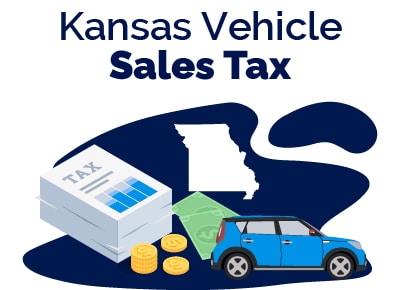

Michael Collado is a car buying expert and has been a professional automotive writer since 2009. He’s written about dealership sales, vehicle reviews and comparisons, and service and maintenance for over 100 national automotive dealerships. Previously, Collado was a copywriter at the ad agency TBWA/Chiat/Day where he worked on brand campaigns for Nissan, ABC Television, Sony PlayStation, and Energizer. His recognition in the ad industry includes awards from Communication Arts and The Clios.
Collado has a Bachelor’s degree from the University of South Florida, with a major in Psychology and a minor in Marketing.
If you're in the market for a new or used vehicle in Kansas, understanding the financial landscape is key, especially when it comes to state sales tax, which stands at 6.5%.
This tax plays a critical role in determining the final cost of your vehicle. Many buyers question if there are tax exemptions or benefits to purchasing a car out of state to lower this expense.
In this post, we'll dive into Kansas's sales tax rate and the additional fees you should anticipate when buying a vehicle, providing you with the comprehensive insight needed to navigate your purchase.
Table of Contents
- How Much Is the Car Sales Tax in Kansas?
- How to Calculate Kansas Sales Tax on a Car
- Kansas Vehicle Sales Tax Calculator
- Do I Have to Pay Sales Tax on a Used Car?
- Which County Has the Highest Tax?
- Which County Has the Lowest Tax?
- Car Sales Tax for Trade-Ins in Kansas
- Car Sales Tax on Private Sales in Kansas
- Tax on Rebates & Dealer Incentives
- Kansas DMV & State Fees
- When Sales Tax Is Exempt in Kansas
- Kansas EV Rebates & Incentives
- Best Car Deals by Category
- Frequently Asked Questions
How Much Is the Car Sales Tax in Kansas?
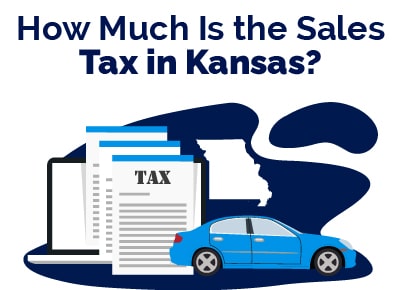 The current statewide sales tax in Kansas is 6.5%. However, rates can vary depending on the location where the vehicle is purchased in the state.
The current statewide sales tax in Kansas is 6.5%. However, rates can vary depending on the location where the vehicle is purchased in the state.
There is an extra local or county sales tax added onto the base 6.5% state tax. Local tax rates range from 1% to 5%, with an average of 1.997%.
The max combined sales tax you can expect to pay in Kansas is 11.5%, but the average total tax rate in Kansas is 8.477%.
How to Calculate Kansas Sales Tax on a Car
To calculate the sales tax on your vehicle, find the total sales tax fee for the city and/or county. The minimum is 6.5%. Multiply the vehicle price (after trade-ins and/or incentives) by the sales tax fee.
For example, imagine you are purchasing a vehicle for $45,000 with the state sales tax of 6.5%. You trade-in a vehicle for $5,000 and get an incentive for $2,000. Kansas does not charge tax on trade-ins and rebates, so you would subtract $7,000 from the car cost, to get $38,000, which is the taxable amount.
In this example, multiply $38,000 by .065 to get $2,470, which makes the total purchase price, $40,470.
Calculate Car Sales Tax in Kansas Example:
- Initial Car Price: $45,000
- Sales Tax Rate: 6.5%
- Trade-In Amount: $5,000
- Rebate/Incentive Amount: $2,000
Sales Tax = ($45,000 - $5,000 - $2,000) * .065
Sales Tax = $2,470
Remember that the total amount you pay for a car (out the door price) not only includes sales tax, but also registration, and dealership fees.
Kansas Vehicle Sales Tax Calculator
Do I Have to Pay Sales Tax on a Used Car?
Yes, purchasing a used car in Kansas does subject you to state sales tax, with rates ranging from 6.5% to as high as 11.5%, depending on the local jurisdiction where the transaction occurs. This means that beyond the state's base rate, local counties and cities may impose additional sales taxes, which can significantly affect the overall cost of the vehicle. Understanding these rates is crucial as they directly influence the final amount you'll spend on a used car. It's important to factor in these taxes when budgeting for your vehicle purchase to ensure you're fully prepared for the total cost.
Which County Has the Highest Tax?
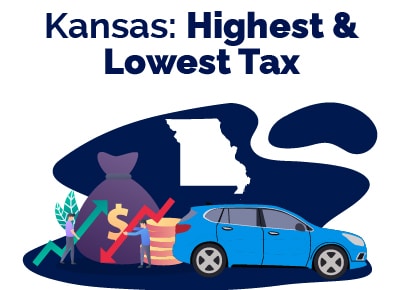 The counties with the highest sales tax rates are Leavenworth and Montgomery County at 11.5%.
The counties with the highest sales tax rates are Leavenworth and Montgomery County at 11.5%.
Which County Has the Lowest Tax?
Clark, Greely, and Stanton Counties have the lowest sales tax rate of 7.5%, which is just 1% local tax.
Car Sales Tax for Trade-Ins in Kansas
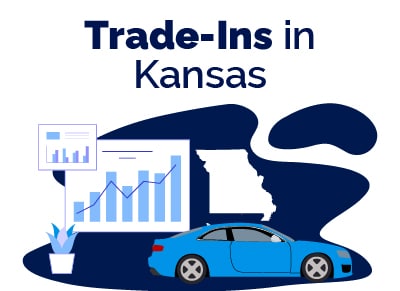 You do not have to pay a sale tax on the trade-in on your vehicle in the state of Kansas.
You do not have to pay a sale tax on the trade-in on your vehicle in the state of Kansas.
In other words, when calculating sales tax, be sure to subtract the trade-in amount from the car price.
Let’s say that you're purchasing a new car for $45,000 and your trade-in is valued at $12,000. This would put your new vehicle purchase price at $33,000, which is the taxable amount.
Car Sales Tax on Private Sales in Kansas
The state sales tax applies for private car sales in Kansas. The rate ranges from 7.5% and 10.6%.
For instance, if you purchase a vehicle from a private party for $27,000, and you live in a county that charges 8% total sales tax, then you will have to multiply the $27,000 sales amount by .08% and get $2,160. That brings the total to $28,160.
Tax on Rebates & Dealer Incentives
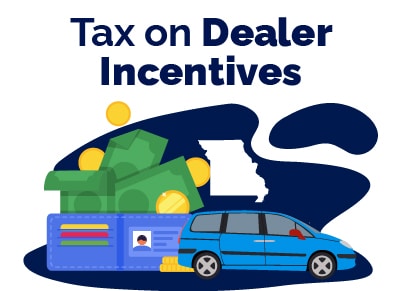 The state of Kansas does not tax rebates and dealer incentives. In other words, be sure to subtract the incentive amount from the car price before calculating the sales tax amount.
The state of Kansas does not tax rebates and dealer incentives. In other words, be sure to subtract the incentive amount from the car price before calculating the sales tax amount.
As an example, let’s say you want to purchase a new truck for $46,000 and the dealer provides a $4,000 rebate. You do not have to pay a sales tax on the $4,000 rebate. Therefore, the taxable amount is $42,000.
Kansas DMV & State Fees
Kansas charges the following DMV and state fees:
Vehicle Registration
- Vehicles less than 4,500 pounds: $42.50
- Vehicles over 4,500 pounds: $52.25
- Motorcycles: $28.25
Other Fees
- Title Fee: $10.00
- Title Transfer Fee: $10.50
Kansas Dealership Fees
Kansas dealerships may charge the following fees:
- Dealer Service & Handling: ~$235
- Transport Fee: $500 to $1,275
- Document Fee: ~$285 (No Statewide Limit)
- Inspection Fee: $10 to $37
When Sales Tax Is Exempt in Kansas
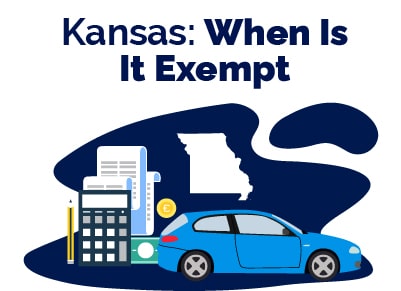 You can avoid paying sales tax on a car sale if you transfer the title from one family member to another. Also, gifted vehicles are exempt from taxes.
You can avoid paying sales tax on a car sale if you transfer the title from one family member to another. Also, gifted vehicles are exempt from taxes.
Also, you can avoid paying state sales tax if you have purchased the vehicle in Kansas and are transferring it out of the state in less than 30 days.
Kansas EV Rebates & Incentives
In addition to the federal tax rebate, Kansas residents are able to claim the following rebates on EV vehicles:
- Less than 10,000 pounds: $2,400
- From 10,000 pounds to 26,000 pounds: $4,000
- Over 26,000 pounds: Up to $40,000
Businesses and homes installing alternative fueling infrastructure or charging stations can get up to 40% of the total cost of installation as a tax credit.
Tax information and rates are subject to change, please be sure to verify with your local DMV.
Best Car Deals by Category
Frequently Asked Questions
What is the sales tax on a car purchased in Kansas?
The state sales tax on a vehicle purchase in the state of Kansas ranges from 6.5% and 11.5%.
Which county in Kansas has the lowest tax?
Clark, Greely, and Stanton Counties have the lowest sales tax rate of 7.5%, which is just 1% local tax.
Which county in Kansas has the highest tax?
The counties with the highest sales tax rates are Leavenworth and Montgomery County at 11.5%.
Do I have to pay sales tax on a gifted car in Kansas?
You do not have to pay tax on a gifted vehicle in Kansas.
How much is registration in Kansas?
Vehicle registration in Kansas is determined by the weight of the vehicle as well as its type:
- Vehicles less than 4,500 pounds: $42.50
- Vehicles over 4,500 pounds: $52.25
- Motorcycles: $28.25
Does a trade-in reduce sales tax in Kansas?
Yes. The value of a trade-in is not taxed. For instance, if you purchase a new SUV for $54,000 and the value of your trade-in is $13,000, then you will only have to pay sales tax on the $41,000.
How can I avoid paying sales tax in Kansas?
You do not have to pay sales taxes on a vehicle if it has been transferred to you by a family member. Also, you can avoid sales tax if you register the vehicle - in another state - without 30 days of the sale.
Posted in Car Buying Tips |




